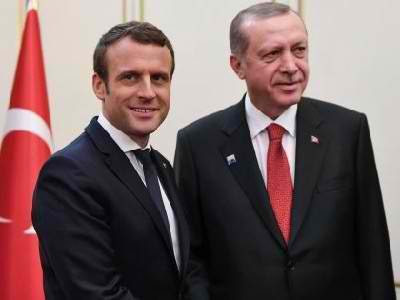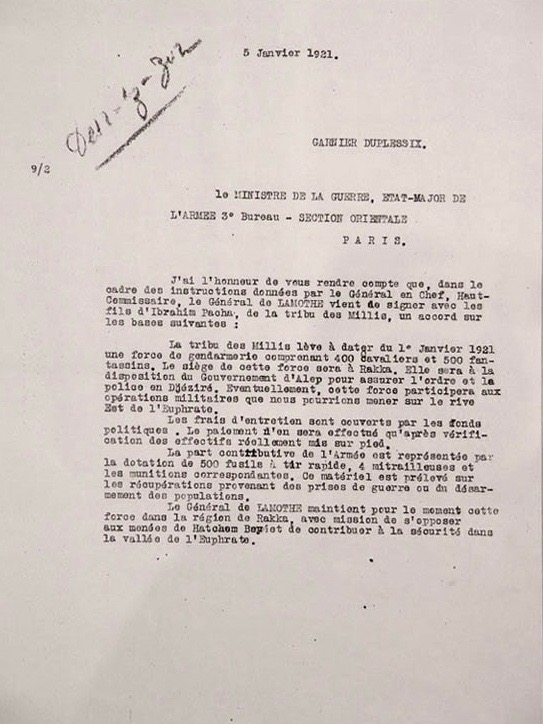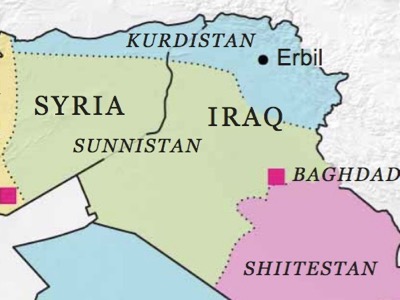The French Plan to Recognize “Rojava”

The discussion in France on where the French jihadists captured in Syria would be judged, is a clear example of a false debate. It is animated by a television presenter and journalist that hide their links to their listeners. The issue of where jihadists of French nationality will be tried is in fact intended to lay the groundwork for getting rid of those that can testify to France’s military role against Syria. Hoping that its allies accept it, France is preparing to recognize a pseudo State, under the name “Rojava”, following the model used in “Kosovo”.
On 5 January 2018, the French President, Emmanuel Macron, received his Turkish homologue Recep Tayyip Erdoğan at the Elysee.
Ankara’s position: this meeting should allow Turkey to strengthen its links with the European Union. It will bypass its current practice of channelling its relations through its traditional partner, Germany, with which relations are now strained.
Key point: Ankara hoped to reach an agreement with Paris on its future plans. The United Kingdom had tasked Turkey with managing the presence of the jihadists, which are now funded by Qatar. President Erdoğan is aiming to fulfill two objectives of his foreign policy:
First: obtain the support of the Kemaist Nationalists by applying the national oath of Ottoman Parliament; the reason for which the Turkish army is illegally occupying North Cyprus, North Syria and Northern Iraq [1].
Concurrently: continue the wars through the jihadists, shifting the centre of fighting from Syria to the Horn of Africa and the Arab peninsula. This is why in the course of the past six months, Erdogan has discreetly led 1,500 soldiers to Somalia and 35,000 to Qatar. He is moving others to Sudan and is getting ready to do the same thing in Djibouti.
Paris’s position: to re-establish mutual commitments, secretly taken in 2011, by Juppé and Davutoğlu with London giving the go ahead. Above all, to establish a new State in the North of Syria to which Turkey would be able to expel its Kurds [2]. This agreement had been unilaterally set aside by President Holland after the battle of Aïn al-Arab (the Syrian city referred to as “Kobani” in keeping with Nato terminology), provoking a strong reaction from Turkey: the attacks perpetrated by Daesh, on 13 November 2015 [3]. This plan is not necessarily contradictory to the current options of the United Kingdom and Turkey.
Knowing full well how reluctant Parliament would be to embark on such a venture, President Macron has chosen to ensure that there is no other option. How? opening in advance a second file.
The Return of the Jihadists
On 4 January 2018, the Secretary of State and Spokesperson for the French Government, Benjamin Griveaux, was interviewed by Jean-Jacques Bourdin on RMC and BFM TV. Benjamin declared that the jihadists made prisoners in Syria by the international coalition against Daesh (that is, by the troops commanded by the Pentagon) will be able to stand trial in the North of Syria “if the judicial institutions can guarantee a fair process: where the “rights of the accused are respected”.
Benjamin Griveaux used to work with Dominique Strauss-Kahn. Now, he is very close to Emmanuel Macron and participated throughout the Macron electoral campaign. Ben’s wife, a lawyer, drafted the legal part of Macron’s programme when he was standing as a presidential candidate.
Not long after, the same journalist, Jean-Jacques Bourdin interviewed in Paris Khaled Issa, a representative of the “Rojava”. The latter confirmed that his “government” is ready to try jihadists who are French nationals. At the end of a sentence, he let the cat out of the bag, announcing that the final decision aut punire aut dedere, would be taken not by France but by a global court for all jihadists whatever their nationality.
The following day, on 5 January, the same Jean-Jacques Bourdin, interviewed the Minister of Justice, Nicole Belloubet. She declares:
“there is no state out there that we recognize, but there are some local authorities, and we can accept that they can proceed with judicial proceedings”.
During these three interviews, never, absolutely never, did Jean-Jacques Bourdin ask his guests if the decisions that could be announced in the “Rojava” would be recognized by the French Courts (Non bis in idem). Unless they were recognized, the defendants would have to be retried and could be sentenced for a second time for the same crime if they returned to France.
When Jean-Jacques Bourdin interviewed the Minister of Justice, he questioned her on other matters. He surprised the public by raising points on which the Chancellery had not for the time being communicated. He did not specify how he had access to this confidential information.
Jean-Jacques Bourdin is the husband of Anne Nivat, a war correspondent, no friend to Russia and notoriously close to the General Management of Foreign Intelligence (DGSE). BFM TV belongs to the businessmen Patrick Drahi and Bruno Ledoux. The latter had kindly provided premises for the “Rojava” to set up a base in Paris.
Benjamin Griveaux and Nicole Belloubet have taken care to avoid responding to journalist’s questions by using the words “Kurd”, “Kurdistan” and “Rojava”. They are only evoking the “authorities” (sic) of the North of Syria.
Towards a violation characterized by the Law
If “Rojava” were to decide to try the French, it would violate the following:
- the bilateral treaty between Syria and France which recognizes the jurisdiction of the Syrian Arab Republic as the only legitimate one on Syrian territory.
- the European Convention on Human Rights and Safeguarding Fundamental Liberties.
• art 6 provides that in order for justice to be equitable, the first thing you need is a court established by the law and a decision that can be enforced. As the “Rojava” does not have prisons, the options would be a not-guilty verdict or a conviction sanctioned by the death penalty (which does not exist in the countries of the Council of Europe). Of course, nothing will prevent recourse to other punishments and to discreetly recycle the accused so that they are fighting within other theatres of operation.
• its article 7 encapsulates the principle that you cannot convict someone of a crime (crimen), less still inflict a punishment (poenam) on them, unless there is a law (lex) which authorizes such action (Nullum crimen, nulla poena sine lege). As we write, there is no Kurdish Penal Code. - Art 7 of the Declaration of the Rights of Man and of the Citizen of 1789, located in the preamble of the French Constitution, requires that those who request, expedite or enforce or have enforced arbitrary orders must be punished.
- the French Constitution:
• Art 55 provides that bilateral treaties regularly applied by the other signatory parties continue to be in force in France. This is the case with the bilateral treaties between France and Syria. - • Art 68 places criminal responsibility on the members of the government and the President of the Republic for any “failure to execute their duties which is clearly incompatible with the exercise of its mandate”.
Scrubbing out witnesses
Prior to committing themselves to a path that it knows to be flagrantly contrary to the Law, the French government has used the media to generate a phobia of “the return of the jihadists”. However, no other country affected by the same phenomenon has started a conversation on this theme. Nothing distinguishes these accused from other assassins that the ordinary courts have penal jurisdiction over and which normally sentence them.
Public opinion has been blinded; the government is trying to shirk off its own responsibility and its predecessors. Some of the detainees cannot but help bringing up during public hearings, their links with the DGSE and the role of the Minister of the Armies in this war.
The Phillippe Macron government is also following the footsteps of previous governments [4]. We remember for example how the Sarkozy-Fillon government managed to wash away the testimonies of French soldiers freed by Syria in the context of a peace accord with the Islamic Emirate of Baba Amr. Not a single French media has published this information, despite articles in the Arab media, in March 2012, when the French military soldiers captured by the Syrian troops were handed over to Admiral Edouard Guillaud at the Syrian Lebanese border.
Towards the automatic recognition of the “Rojava”
The principle of res judicata [translator’s note: a matter that has already been ruled upon] ensured that the Rojava was automatically recognized as a sovereign and independent state.

In this telegram of 5 January 1921, the French High Commission for the Colonization of Syria (mandate granted by the League of Nations) announces that it is recruiting, with the help of the Turkish, 900 men from the Kurdish tribe of the Millis to repress the Arab nationalist rebellion at Aleppo and Raqqa. These mercenaries will fight as French policemen under the flag that the current Syrian Free Army (Telegram of 5 January 1921) wave. (Source: Archives the French land forces)
Historically, the Kurds are a nomadic people. They are like the Gypsies in Europe, only a warlike version. They roam about in the valley of the Euphrates and can eventually cross the North of what currently is Syria [5]. At the end of the Ottoman Empire, some groups of Kurds were recruited to participate in exterminating the Christians in general and the Armenians specifically [6]. The reward for carrying out these crimes: they receive the lands of the Armenians that they had massacred and they settled themselves there. During the French colonization, the Kurds belonging to the tribe of the Millis had been recruited to wipe out Arab nationalism in Raqqa and Aleppo, then they left Syria when it became independent.
The “Rojava” had been created on Arab territory where the Kurds have only established a continuous presence since the repression where they were collectively victims during the Turkish civil war in the 1980s. The Christian and Muslim Arab populations had lived there and had been expelled from there during the war against Syria. Now the Kurds were preventing them from returning there as citizens.
The “Rojava” was then placed in the hands of the PYD. This was a Kurdish party that was formerly of pro-Soviet Marxist-Lenin ideology, but made a sudden turn and switched to being anarchist and pro-US [7]. Despite the claims of its communicators, it retains a highly structured hierarchy, a totalitarian cult of its founder and an iron will. The best one can say is that there is parity in the positions of responsibility. They are occupied simultaneously by a man and a woman. This new organization is applied also to the general staff whereas the women are rare in this militia; in any event, more rare than in the mixed armies of the region, Tsahal and the Syrian Arab Army.

Published by Robin Wright, nine months before the Daesh offensive in Iraq and Syria, this map presents the borders of the “Rojava” and the “Caliphate”. According to the Pentagon researcher, this map rectifies the map that Ralf Peters published in 2005 for remodelling the enlarged Middle East.
In 2013, the Pentagon had forecast supporting the French-Turkish plan in the context of remodelling the enlarged Middle East. It would have simultaneously organized the creation of a “Sunnistan” straddling Iraq and Syria (see Robin Wright’s map). However, it abandoned these two plans when President Trump decided to eliminate Daesh, no longer considering the Kurdish question as a justification for GI’s being in Syria. So, it will be necessary to also bring the United States back to the initial plan.
Furthermore, having taken into account Israel’s failure last year to create another Kurdish state, this time in the North of Iraq [8], Paris and Ankara must anticipate the opposition of Iran, Iraq and Syria and more generally, almost the entire Arab world.
In 2011 Ankara was proactively pursuing its desire to create pseudo Kurd state in the North of Syria. It is now opposed to it, if the new entity is sponsored by the United States (which has tried to assassinate President Erdogan three times and funded a Kurdish party to make him lose his majority in Parliament). During this joint press conference with President Macron, Recep Tayyip Erdogan had indicated its red line: to rule out any possibility for the PKK — that France is also qualifying as a “terrorist organization” — creating a corridor permitting it to import arms from the Mediterranean towards Anatolia in the South East. From there, the issues are limited to ensuring that the conflicts between the PKK and the “Rojava” provoke a clean break and that the new state does not have access to the Mediterranean as had been forecast in the initial plan.
Translation by Anoosha Boralessa
*
Thierry Meyssan is a political consultant, President-founder of the Réseau Voltaire (Voltaire Network). Latest work in French – Sous nos Yeux. Du 11-Septembre à Donald Trump(Right Before our Eyes. From 9/11 to Donald Trump).
Notes
[1] “The Military Strategy of the New Turkey”, by Thierry Meyssan, Translation Anoosha Boralessa, Voltaire Network, 14 October 2017.
[2] “The unavowable project for a pseudo-Kurdistan”, by Thierry Meyssan, Translation Pete Kimberley, Voltaire Network, 7 December 2015.
[3] “The motive for the attacks in Paris and Brussels”, by Thierry Meyssan, Translation Pete Kimberley, Voltaire Network, 28 March 2016.
[4] “Training French soldiers to supervise Daesh”, Translation Pete Kimberley, Voltaire Network, 27 October 2016.
[5] On the Kurds, read the three part enquiry of Sarah Abed, Voltaire Network, September 2017.
[6] “Today’s Turkey continues the Armenian genocide”, by Thierry Meyssan, Translation Pete Kimberley, Voltaire Network, 14 May 2015.
[7] “NATO’s Anarchist Brigades”, by Thierry Meyssan, Translation Pete Kimberley, Voltaire Network, 12 September 2017.
[8] “Kurdistan – what the referendum is hiding”, by Thierry Meyssan, Translation Pete Kimberley, Al-Watan (Syria) , Voltaire Network, 26 September 2017.
All the images in this article are from the author unless otherwise stated.

